1974 Baseball Season: The Oakland Athletics won their third straight World Series.
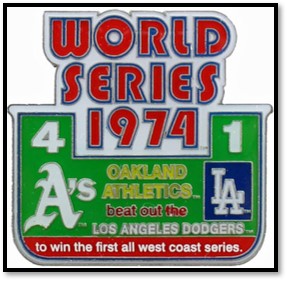
Bait and Switch: This marks the conclusion of the baseball portion of this program. Although Hot Stove is primarily a baseball newsletter, I sometimes veer off to music, movies and politics. That’s what’s happening here.
The Reason: Tomorrow marks the 50th anniversary of Mike White’s successful 1974 primary campaign for County Executive. I was Mike’s campaign manager. Jan Hodgson ran our campaign headquarters.
For this landmark anniversary, the three of us have been working on a reunion of politicos and volunteers from the 1970s. In 1974, this included the campaigns of Senator Tom Eagleton, Congressman Dick Bolling and state auditor nominee George Lehr. Some other familiar names from the decade: McGovern, Morris, Schramm, Teasdale, Carter, Mondale, Litton, Symington and Hearnes. And city “nonpartisan” races like the 1979 mayoral race featuring Watkins, Berkley, Pelofsky and Wheeler.
The series of invites for the party have included campaign stories from 1974, and these are consolidated below. We have no doubt missed some folks – it’s been 50 years – so if anyone out there in Hot Stove land is reunion material, feel free to join us on Thursday, August 8 from 4 to 7 at JJ’s, 4810 Roanoke Parkway (the building with the Polsinelli signs). Cash bar.
For those on the reunion list who have already seen the invites, there is still something new for you. Scroll down to Lonnie’s Jukebox to listen to some rock ‘n’ roll from 1974. The songs are 50 years old, but still sound good.
As for those Hot Stove subscribers who do not fit this reunion demographic (especially those not yet born in 1974), I thought you might like to read about this slice of local political history. And the music is fun at the end.
The Mike White Campaign: The story begins in 1972 when Mike, after an extended recount, won his county legislative race by one vote over Republican Paul Kartsonis (14,071 to 14,070).
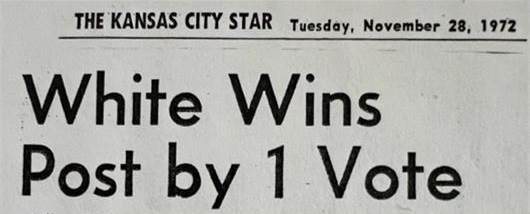
When Mike won that office in 1972, George Lehr was in the middle of his 4-year term as Presiding Judge, and under the new charter, Lehr became County Executive. When Lehr announced he would run for State Auditor in 1974, the County Executive race was up for grabs.
The field for the County Executive race narrowed to two major candidates: James P. Aylward, Jr. and Mike White. Both were considered “good government” types, and each had run for their first office with support from the Committee for County Progress (CCP), Jim for county collector in 1970 (succeeding George Lehr) and Mike in 1972 for his county legislative seat. Mike’s one-vote win had given him some notoriety, and the Aylward name was well known in county politics.
Mike and I began working on a campaign plan with our former law school classmate Paul Edwards who had been active in several campaigns and was now a political consultant. I signed on early as Mike’s campaign manager. My first involvement in politics began in 1968 through the South and Eastern Jackson County Young Democrats. We were closely aligned with the CCP and several of us were on the 120-person CCP board. In 1968, much of the Black Hat/White Hat distinction remained and so I did not often cross paths with Ken Hill when he was managing the Bill Morris campaign for Lt. Governor.
In early 1974, everything fell into place for the Mike White campaign. CCP leader Jim Nutter was for Mike. Bill Morris was for Mike. Morris told Mike that Ken Hill was back in town and would be a good campaign worker for him. Mike, Ken and I began meeting for lunch every Monday for a planning session. We found the perfect person to run the headquarters – Jan Hodgson. We had a solid fundraising team. There was a large volunteer and headquarters operation. Mike got endorsements from the CCP, Freedom and several of the old-line factions.
Mike’s communications guru Sandy Overbey produced a novel yard sign campaign. A first set of teaser signs went up: “Do it Right.”
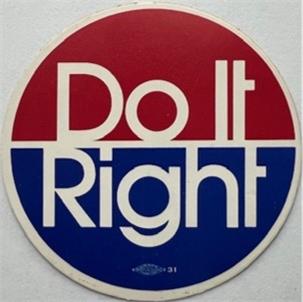
About a week later, signs with the same design hit the lawns, this time saying “Mike White.” The buzz was terrific.
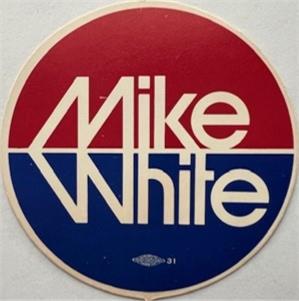
Mike won handily. Below: Lonnie, Mike and Ken on that joyful primary election night. [Political Trivia: That was August 6, 1974. Three days later, President Richard Nixon resigned.]
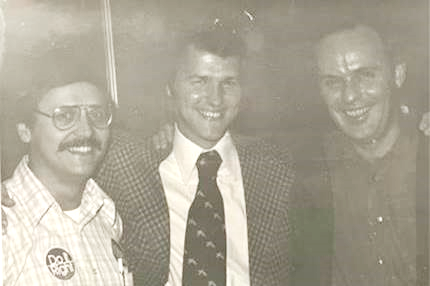
Ken already had another item on his agenda. He thought I should be Chairman of the Jackson County Democratic Committee and quickly formulated his plan. A major obstacle was that I was not on the County Committee, and so Ken asked Bob Jacobi to resign his seat so I could then fill the vacancy. Bob graciously agreed. Although there was serious competition, Ken locked up enough votes to get me elected.
[For more on the 1972 one-vote win and the 1974 campaign (plus other campaign history), see “The Power of One Vote” (click here) and “Ken Hill – From Pendergast to Carnahan” (click here).]
This took us to the general election campaign for November:
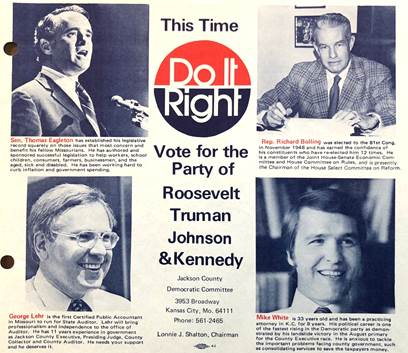
The County Committee opened a Democratic headquarters on Broadway, headed up by (of course) Jan Hodgson. Below, Jan and Lonnie on the campaign trail in 1974.
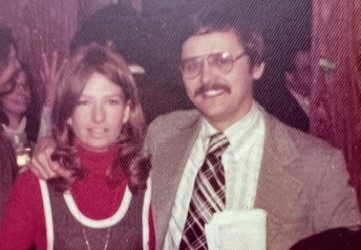
WE WON!!

Kay Waldo: With Mike running for County Executive, the CCP needed a new candidate for his third district seat. As shown on the CCP sample ballot below, the endorsement went to Kay Waldo.
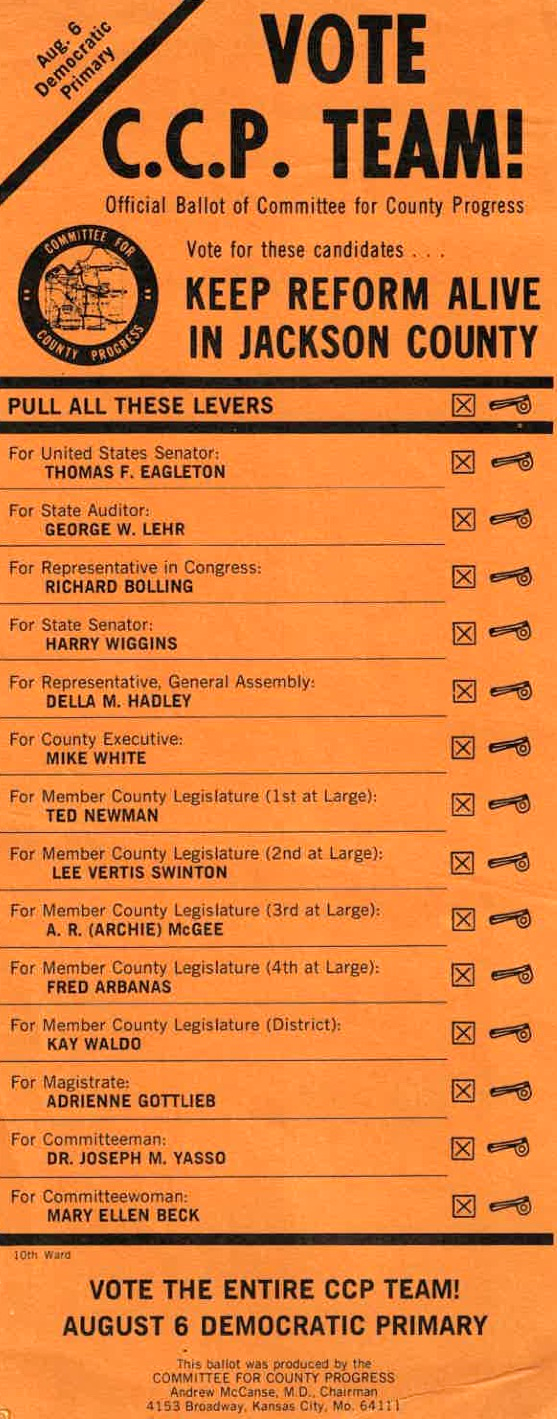
Here’s Kay on her first political race:
“I’ll aways remember the night in 1973 when I was attending a political ‘cocktail party’ in the sunken lobby area of the (then) Alameda Hotel. I vividly remember a conversation with two men, Lonnie Shalton being one. They told me Mike White was running for County Executive which would leave open his county legislature seat in the 1974 election. They suggested I run for the seat.
I was dumbfounded as I’d never (consciously) thought about running for any political office. I said I’d think about it, and boy, did I ever think about it…so much so that 24 hours later, I decided to run. Even close friends were surprised at my decision, but they rallied around me. Quickly, we put together a campaign team, and the race was on.
I remember going door-to-door in the Waldo portion of the district and being amazed at how many people I met who said they’d vote for me because my last name was Waldo…even though they knew nothing about me otherwise.
The campaign went well, and I had the opportunity to serve Jackson County from 1975 to 1979. One of my most positive memories of that time was working with Mike as he served as County Executive. As I’ve told so many since, he continues to be the best example I’ve ever experienced of an exceptional elected official. He was terrific to work with and a great leader. Thanks, Mike!”
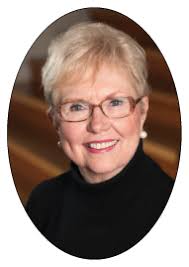
Kay took office on January 1, 1975, joining 14 other members of the…
County Legislature: Under the charter passed in 1970, the first county legislature was elected in 1972. The term was for two years, and then in 1974, all seats were again open, but the term going forward was four years.
In those days, the county legislature had 15 members (11 district and 4 at-large). Today, it has 9 members (6 district and 3 at-large).
The drawing below (I believe from the Kansas City Star) depicts the 15 county legislators serving during the Mike White administration (1975-1979). From left on the front row, some with uniform numbers matching their district number, Virgil Troutwine (7), Father John Giacopelli (6), Lee Swinton (2-AL), Harry Griffitts (9), Archie McGee (3-AL), Mamie Hughes (4), Fred Arbanas (4-AL), Ron Spradley (2; the football, presumably because he was the sole Republican), Kay Waldo (3), Doc Holliday (5) and Pat Rios (1). In the back, Bob Johnson (10), Joe Bolger (11), Ted Newman (1-AL) and Bob Jacobi (8).
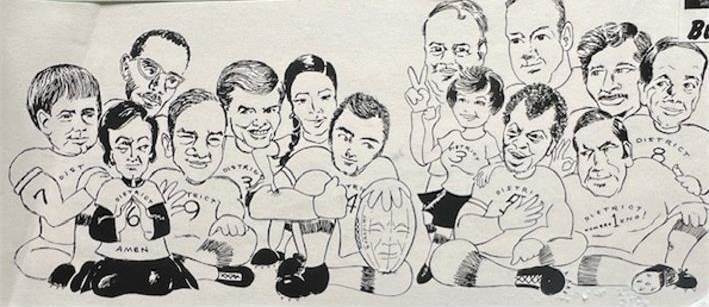
Waldo for Kansas City: After Kay’s four years on the county legislature, she ran for and won a seat on the city council of Kansas City. She lost in her bid for a second term but came roaring back in 1999 (as Kay Waldo Barnes) to become the first woman to serve as Mayor of Kansas City. Kay served two terms (1999-2007) and was universally lauded for her accomplishments. My personal favorite – the revitalization of downtown.
Where’s Waldo?: Over the last five decades, Leland Shurin has been collecting campaign buttons. Many are mounted and framed, and I chose to depict the one below because it has a Kay Waldo for City Council button.
This of course presents the age-old question. Where’s Waldo?

Big Dates: Then and now.
August 6, 1974 – Mike White won the Democratic primary for County Executive.
August 7, 1974 – Republican Congressional leaders, led by Senator Barry Goldwater, met with Richard Nixon to tell him some bad news.
August 8, 1974 – On national TV from the Oval Office, Nixon announced his plan to resign.
August 9, 1974 – Nixon officially resigned and left the White House grounds in a helicopter. Gerald Ford took the oath of office.
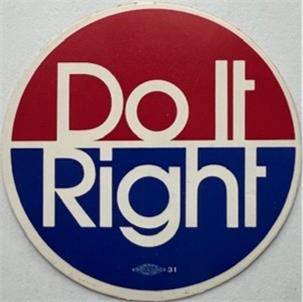
August 5, 2024 – Today, Kamala Harris will officially become the Democratic nominee for President!!!
August 6, 2024 – 50th anniversary of Mike White’s primary win.
August 6, 2024 – Primary Election Day, Missouri and Kansas.
August 8, 2024 – 50th anniversary party (and we can also toast Kamala).
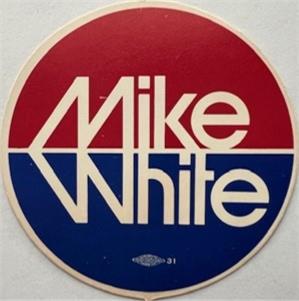
The Presidential Campaign (As of 1974): Although the presidential election was two years away, the field of Democrats running for President exploded. The prospect of running as a Democrat in the wake of Watergate was appealing. Many of those candidates made early stops in Kansas City, and two were the eventual running mates for 1976.
Walter Mondale in 1974: In October of 1974, the Jackson County Democratic Committee (with an assist from Senator Tom Eagleton) brought in Senator Walter Mondale to speak at a general election rally. At this stage, Mondale was making a test run for the presidency. After Mondale finished his speech, I remember thanking him and, in the high of the moment, telling the crowd that we just heard from the next President of the United States. Sounded good, and he had said he was 99% sure he would be running in 1976. The next day, we hosted a breakfast for Mondale to meet local Democratic politicos (like Rita and me below).
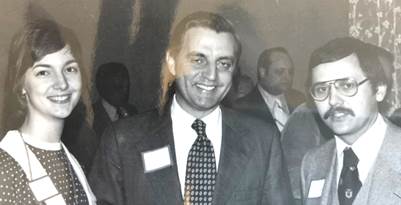
After the breakfast, Mike and I took Mondale to the airport in Mike’s old Ford. Three Mondale staffers took the back seat, and Mondale was squeezed (not happily) in front between Mike and me.
The next month, Mondale ended his presidential run, saying, “After more than a year of constant travel, constant fundraising, and constant speeches, I had pulled about even with ‘None of the Above’ in national opinion surveys, and I dropped that bid – to widespread applause.” Cramped car rides with political groupies had probably not helped.
Mondale and Jan: A familiar name in Kansas City is Jan Marcason who served on the KC City Council from 2007 to 2015. Back in 1974, Jan was a staffer in the D.C. office of Senator Walter Mondale.
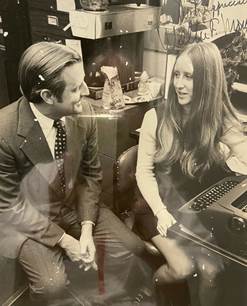
Jimmy Carter in 1974: In December of 1974, the Democratic National Committee held its Mid-Term Convention in Kansas City. Many of the potential presidential candidates attended. Mike White, Ken Hill and I hosted a series of events to introduce the candidates to local Democratic leaders.
The one I remember best is the breakfast with Jimmy Carter. Mike found Carter to be the most intense and remembers him finishing his talk with “I don’t intend to lose.” After the breakfast, Mike told Ken and me we had just been sitting with the next President. At the time, Carter was polling at about 1%. Below, Carter at the Mid-Term Convention.
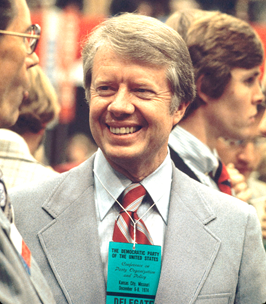
Serendipity: Nice timing for us. In 1974, we had hosted Mondale (who dropped out) and Carter (who was at 1%). Two years later, they were running mates campaigning for the White House. Ken Hill was an early leader for Carter in the Missouri caucuses. Mike was a Missouri co-chair of the Carter/Mondale campaign. I was a volunteer on the Mondale advance staff and worked in several states in the two months before the election (and continued part-time on VP trips from 1977 to 1980). Good times. Especially when you win.

Some Other Campaigns in the 1970s: A sampling from the decade.
1976: Karen McCarthy (then Benson) and Alan Wheat each won their first elective office, state representative. They both moved on to Congress, Alan in 1983 to succeed the retiring Dick Bolling, and Karen (as McCarthy) in 1995 to succeed Alan who made a bid for the U.S. Senate (he won the primary, but not the general).
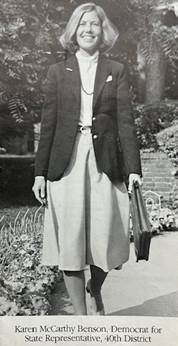
1977: Sometimes an election loss becomes a first step in a big victory. Ken Hill pulled Karen McCarthy Benson and me (and many others) into an election campaign for a science museum at Union Station. We got false hope when over 10,000 people came to an open house at Union Station. Alas, the property tax strategy was unpopular, and it failed. But the concept was right, and a bi-state sales tax plan found success in 1996.
1978: Albert Riederer ran for an at-large seat on the county legislature. He won, and two years later, he was elected prosecutor and served three terms. Albert’s successor as prosecutor was Claire McCaskill who later became State Auditor and a U.S. Senator.
1979: In an epic primary for Mayor, the incumbent Charlie Wheeler faced three respected city councilmen: Bruce Watkins, Dick Berkley and Joel Pelofsky. Each candidate got more than 20% of the vote. Watkins and Berkely came in first and second to qualify for the general election. Berkley was well known to be a Republican and Watkins a Democrat. But with the city elections being nonpartisan, the supporters, donors and the voters did not all line up by party. Although Watkins got a boost when Vice President Mondale came to Kansas City for a rally, Berkley prevailed and served three terms. For a play-by-play recap of that 1979 election, see this post.
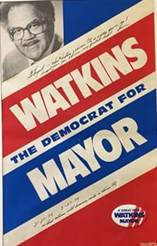
But again, an election loss had a silver lining. Bruce proved that an African American candidate could make a strong run for a major office in Kansas City. He set the stage for Alan Wheat’s win for Congress in 1982 and so far three African American mayors (Emanuel Cleaver, Sly James and Quinton Lucas). Cleaver has been our representative in Congress since 2005.
Polsinelli Connection: The headquarters for Mike White’s 1974 campaign was run by Jan Hodgson out of an office on the second floor of the Commerce Bank Building on the Plaza. When Jan needed to make photocopies, she headed across the street to a law office. The partners at that office were friends from our UMKC law school days, and they were pitching in to support Mike.
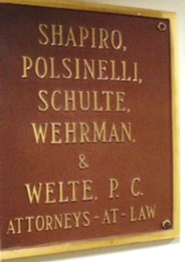
As Mike entered his fourth year in office in 1978, polling showed he was the most popular figure in local politics. But rather than running for reelection, Mike decided to return to practicing law. I tried to recruit him to my firm (Popham, downtown), but he turned it around and lured me join him on the Plaza with our UMKC classmates. We liked the idea of being in a small law firm on the Plaza. Lee Shapiro had retired from the practice, but four of our UMKC law fraternity brothers remained (see plaque above). Mike and I boosted the partner number to six, and there were three associates. The partners agreed to two goals: (i) We would never expand beyond 25 lawyers, and (ii) we would stay in our cozy offices in the Plaza Theater Building. We failed to accomplish either goal, but it all worked out just fine.
Mike was at the firm for over 20 years, and I retired from the firm a few years ago. So, it seems fitting the 50th anniversary party will be at JJ’s in the building that today houses Polsinelli’s nationwide headquarters.
Memorabilia: Rita (long ago) threw me a Beatles-themed 64th birthday party (“Will you still need me…”). Jan Hodgson and Kay Wallick prepared a supersized birthday card with a collage of political memorabilia from the 1970s. Lots of great memories. It will be on display at the party. Here is a sneak preview.
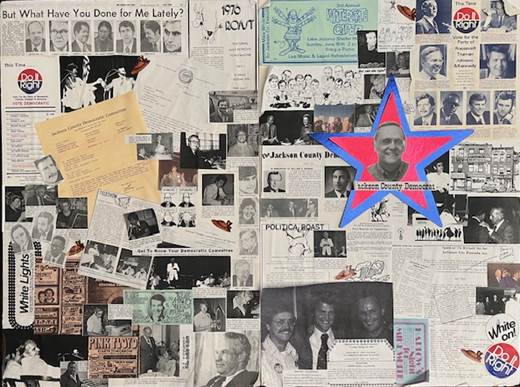
Lonnie’s Jukebox – 1974 Edition: Moving on from the politics of 1974, it’s time for some music from that year. To get started:
“Billboard Number 1 Songs of 1974” – In just two minutes, snippets of all 35 #1 songs of 1974.
Now, to slow it down, here is a setlist selected from the Billboard Hot 100 Singles for the year.
“The Way We Were” by Barbara Streisand. The title song to the 1973 movie won the Oscar for best song. It was #1 for three weeks in February of 1974 and was named Billboard’s #1 single for the year.
“The Entertainer” by Scott Joplin/Marvin Hamlisch. At the Oscars ceremony in April of 1974, the award for best film went to The Sting (in my personal top-ten of best movies). The film starred Robert Redford, (who was Barbara’s love interest in The Way We Were) and Paul Newman. The theme music was composed by Scott Joplin and adapted by Marvin Hamlisch.
“Jungle Boogie” by Kool and the Gang. This was a #4 hit in 1974. Twenty years later, it was popularized on the soundtrack of the movie Pulp Fiction. Its use in the film is barely detectable. It is gently playing on the car radio while Vincent (John Travolta) explains to Jules (Samuel Jackson) some cultural differences between America and Europe. This includes exploring how McDonald’s does not sell a ” quarter-pounder with cheese” in Paris because France is on the metric system. So, it’s a “Royale with cheese” Great movie scene. Film clip here. Thanks to movie aficionados John, Butch and Steve for reminding me of this (as part of a deep discussion over morning coffee of why the Club Royal at 3732 Main was often called Club Royale).
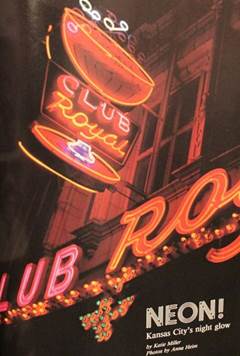
“TSOP (The Sound of Philadelphia)” by MFSB featuring the vocals of Three Degrees. MFSB stood for “Mother Father Sister Brother,” and the group was a pool of 30 session musicians acting as the house band at Philadelphia’s Sigma Sound Studios (backing up groups like the O’Jays, Spinners, Wilson Pickett, etc.). “TSOP” became the theme for Soul Train in 1974 and was the first TV theme song to hit #1. The popular syndicated TV show ran from 1970 to 2006 (1,117 episodes).
“The Most Beautiful Girl” by Charlie Rich. Excellent country song that crossed over and went to #1 on the pop chart. A cover version was performed by George Costanza on Seinfeld after George had broken up with his girlfriend (click here).
“The Joker” by the Steve Miller Band. This #1 hit in 1974 in the U.S. became a #1 hit in 1990 in the U.K. after being reissued in connection with a cool Levi’s commercial (click here).
“Rock and Roll Heaven” by the Righteous Brothers. The song honors departed rock ‘n’ rollers, including Jim Croce who died in a plane crash in September of 1973. In December of 1973, Croce had a #1 posthumous hit, “Time in a Bottle.” He had one more hit after that…
“I’ll Have to Say I Love You in a Song” by Jim Croce. He wrote this song after having a disagreement with his wife. Instead of continuing with an argument (when the words just “came out wrong”), Croce wrote this song overnight and sang it to his wife the next morning.
“Midnight at the Oasis” by Maria Muldaur. “Let’s slip off to a sand dune, real soon/And kick up a little dust…”
“Then Came You” by Dionne Warwick and the Spinners. Love the delivery of the hook, “Never knew love before, then came you, then came you.”
“Band on the Run” by Paul McCartney and Wings (official music video). This is in memory of Jim Fitzpatrick. He loved to tell the story of seeing the group in concert at Kemper Arena (“the best concert I ever saw”) and specifically enjoying the “incomparable” “Band on the Run.”
For my signoff today, back to baseball and 2024…